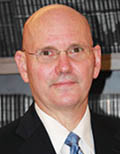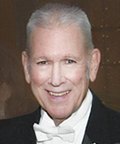
Fall 2017 - Vol. 12, No. 3
GAME CHANGERS
Henry W. Huffnagle, M.D.
1933-2016
Paul R. Sieber, M.D.
Lancaster Urology
Editor’s note:The cover of JLGH proclaims that it is a “Record of Medical Progress.” It seems self-evident that progress is manifested by the introduction of new practices or the improvement of old ones, but it is equally obvious that these advances are usually initiated by individuals. When someone dies who played an unusually prominent role in propelling medical progress at LGH, it seems proper for this Journal to take note of their passing by recalling their contributions.
Urological Associates of Lancaster (now known, after a merger, as Lancaster Urology), has been a pillar of our medical community for decades. When Dr. Henry Huffnagle, one of UAL’s founders, died last fall, I felt that his impact on the Lancaster community should be described by someone who knew him well. I asked Dr. Paul Sieber, one of the senior members of UAL and a member of the JLGH Editorial Board, to prepare a short personal reflection that summarized Dr. Huffnagle’s pioneering efforts as a member of the Lancaster medical community.

Henry Huffnagle, M.D.
Dr. Henry Huffnagle passed away on October 7, 2016 after a career as an active staff member at Lancaster General that spanned more than 30 years. Henry was a Lancaster County native who was born and raised in Quarryville. He graduated from Franklin and Marshall College and went on to medical school at the University of Pennsylvania where he also completed his urology training.
He joined Dr. Ian Hodge in Lancaster, and they established the group known for decades as Urological Associates of Lancaster (UAL). He started his career at Lancaster General Hospital in 1966, and continued until his retirement in 1998, during which time he played a prominent role. He performed the first radical cystectomy at LGH at a time when people traveled to Philadelphia for such a complex procedure.
In addition, Henry was a strong enthusiast of many significant leadership accomplishments by members of UAL. He supported Ian Hodge as the first of three partners of UAL – the others being Drs. Victor Agusta and F. Michael Rommel – who served as presidents of the Mid-Atlantic section of the American Urological Association. He encouraged the development of and participation in clinical trials here, and UAL (now Lancaster Urology) has participated in more than 200 clinical trials. In addition, UAL has been one of the largest members of the CAPSURE (UCSF Cancer of the Prostate Strategic Urologic Research Endeavor) database, a 20-plus year project which has led to more than 175 peer reviewed articles on prostate cancer outcomes. Henry encouraged adding ultrasound to our routine office practice, and it now serves as the urologic stethoscope for urologists. Henry would surely be excited that Lancaster Urology is the first group in our region to offer the new MRI/ultrasound fusion biopsies to our standard armamentarium in the diagnosis and treatment of prostate cancer.
Besides a long, productive practice at Lancaster General and with UAL, Henry did much more. He was an avid outdoorsman and self-taught naturalist and botanist who loved spending time on his farm in southern Lancaster County. He completed the Appalachian Trail and Vermont’s Long Trail, as well as Wainwright’s Coast-to-Coast Trail in northern England. He was passionate about preservation issues in Lancaster County, and instrumental in the development of The Lancaster County Conservancy where he served as board chair in his later years. In addition, Henry served on the boards of the North Museum, Lancaster County Community Foundation, the Pennsylvania Academy of Music, Homestead Village, Lancaster Country Day School, and the Hamilton Club. He was an active member of the Quarryville Ground Hog Lodge, and never missed a Ground Hog Day.
Dr. Huffnagle was described in his formal obituary as an “iconoclast” and a “giant slayer.” He will be remembered as a man of deep ethical conviction whether dealing with the CEO, colleagues, nursing, or support staff at Lancaster General. A quote from Tom Brokaw’s The Greatest Generation seems most appropriate: “A common lament of the World War II generation is the absence today of personal responsibility.” Henry took responsibility for his own actions and expected others to do so as well. As a World War II child, he set a high bar for future generations at Lancaster General.
When I think of Henry, it brings a smile to my face. He will always be remembered as a real character with an old-fashioned crew cut, who bluntly but tactfully always told it like it was, whether at work or play.